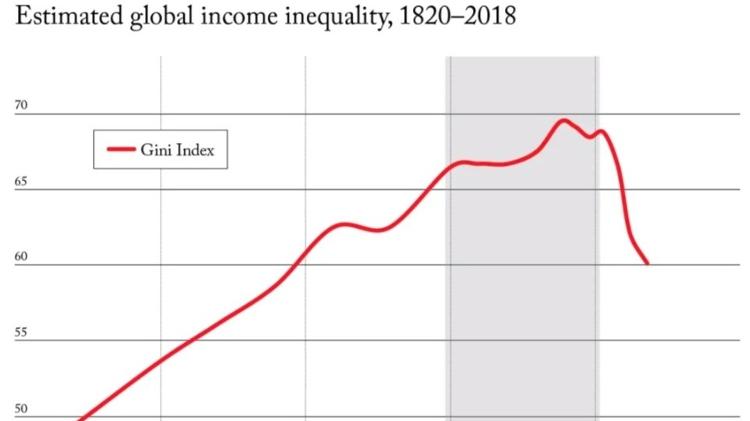Inequality is declining in the world and growing in large countries
3 min read

Global inequality has not been this low since the late 19th century, and while the global Gini index is still very high, it is the lowest it has been in 125 years. It has dropped from 70 to 60 over the past 20 years. At the same time, inequality has increased within large countries such as the United States, India, Russia, and most of Europe.
The main driver of the decline in global inequality in these two decades has been the growth of China, which has lifted hundreds of millions of people out of poverty in recent decades. But this global trend toward reduced inequality is unlikely to last much longer. For several reasons:
slowing Chinese growth;
As they get richer, fewer Chinese leave the base of the global income pyramid Thus, improving their condition fails to reduce inequality in the world;
Inequality within China is increasing.
The average income of a Chinese person in 1988 placed him in the bottom half of the world scale, among the poorest 45% of the world’s population. Today, the same as the average Chinese are among the richest 70%.
And just as importantly, the Chinese are at the top of the global income pyramid. If the country continues to grow by three percentage points annually more than the United States, in two decades there will be as many Chinese millionaires as there are Americans. This will change the balance of consumption and behaviour, with profound cultural impacts.
The Gini coefficient ranges from 0 to 100 and the lower the better, with zero allocated to the scenario in which everyone has the same income and 100 if one individual concentrates all the income. In the global index, the comparison is between the incomes of countries, while the national index takes into account the income of citizens.
during the programme news analysiscolumnist UOL José Roberto de Toledo also highlighted that although inequality has decreased in a global context, only in a few countries in Latin America has there been a decrease in population inequality. Intra-country inequality has grown in Western Europe, the United States, China and Russia. In Latin America, the decline in inequality has been driven mainly by income distribution programmes.
Expect slowdowns. After the Gini index has fallen by 10 points over the past 20 years, it is expected that with more modest growth in China’s GDP, the decline will not continue. The hope for maintaining this trend is that India, the most populous country in the world, goes through a process of economic growth similar to China, or that Africa leaves the majority of the poverty its population faces today.
Political unrest, polarization, and the rise of the far right. The change in the economic level of the Chinese population helps explain the current global context. Middle-class people in Europe and the United States began to experience more economic hardship and ended up losing out compared to other segments of the world. This helps explain the political upheaval, polarization, and rise of the far right in many countries.
Inequality decreased in Brazil. Following the global trend, inequality has also decreased in recent years and is now just over 50 points, lower than the global average of 60. Although it is still far from being an egalitarian country, this decline in inequality is mainly due to Income distribution programs such as Bolsa Familia.
* The information in this text was originally published by economist Blanco Milanovic in Foreign Affairs (The Great Convergence: Global Equality and Its Discontents).
***
a news analysis It airs on Tuesdays, Wednesdays, and Thursdays at 7 p.m.
Where to watch: I live at home UOLAnd UOL on YouTube and Facebook UOL.
Watch the full program:

“Devoted food specialist. General alcohol fanatic. Amateur explorer. Infuriatingly humble social media scholar. Analyst.”

